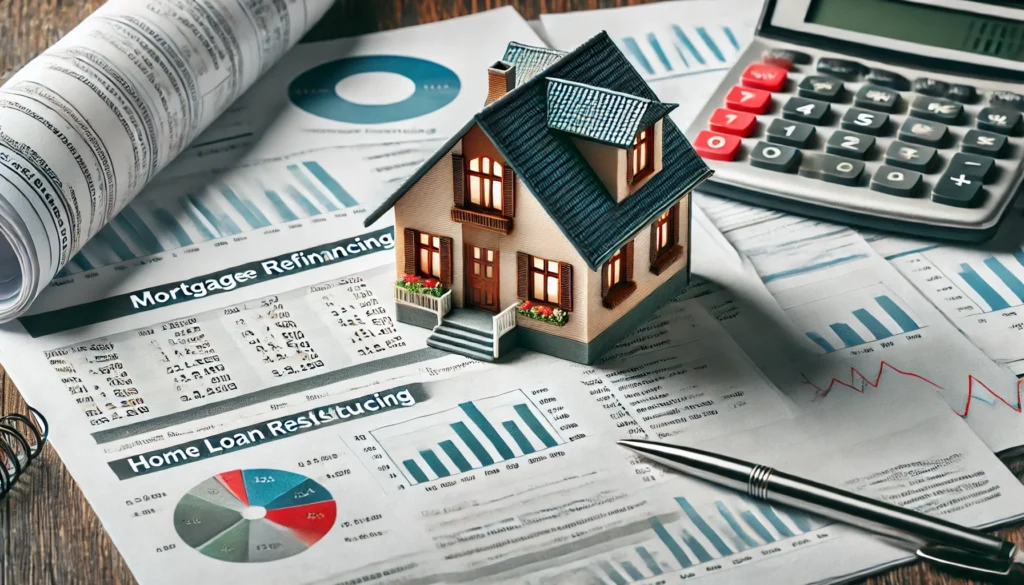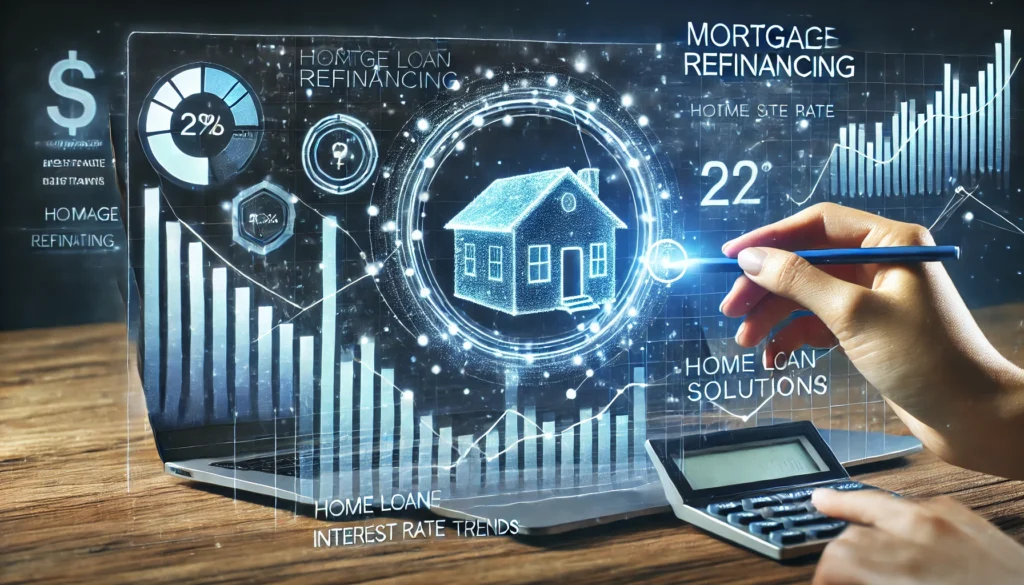Introduction: Exploring the Concept of Rolling a Refi into a Mortgage
Refinancing a mortgage can be a strategic financial move, but borrowers often wonder whether they should roll refi into a mortgage or explore alternative options. This decision can impact monthly payments, long-term interest costs, and overall financial stability. Some homeowners choose to consolidate debt or leverage equity by rolling their refinance into their mortgage. However, the process requires a thorough understanding of its benefits, risks, and eligibility requirements. This article explores whether rolling a refinance into a mortgage is a sound financial decision and what factors borrowers should consider before making this commitment.
You may also like: Best Student Loan Refinance Options in 2025: Compare Rates & Save Thousands
The Basics of Mortgage Refinancing
Refinancing a home loan involves replacing an existing mortgage with a new one, often to secure a lower interest rate or more favorable terms. Many borrowers choose to refinance to reduce monthly payments, shorten their loan term, or tap into home equity. While refinancing can lead to cost savings, it is essential to consider the upfront costs and fees associated with the process. Understanding these financial implications can help homeowners determine whether rolling a refi into a mortgage aligns with their long-term goals.

Weighing the Pros and Cons of Rolling a Refi into a Mortgage
The decision to roll refi into a mortgage comes with advantages and disadvantages. On the positive side, consolidating debt into a mortgage can lead to lower interest rates compared to high-interest debt like credit cards or personal loans. Additionally, a single monthly mortgage payment can simplify financial management and improve cash flow. However, extending the mortgage term may result in paying more interest over time. It is crucial for homeowners to calculate the total cost impact before committing to this refinancing strategy.
Costs and Fees: What to Expect When Refinancing
Many borrowers ask, “Pay upfront to refinance a home mortgage, is it normal?” The reality is that refinancing often involves closing costs, which can range from 2% to 5% of the loan amount. These costs may include appraisal fees, loan origination fees, title insurance, and prepaid interest. Some lenders offer no-closing-cost refinancing, but this typically results in a slightly higher interest rate. Understanding these expenses can help borrowers determine whether the benefits of refinancing outweigh the costs.
Alternatives to Rolling a Refi into a Mortgage
For homeowners hesitant about rolling a refi into their mortgage, alternative options exist. One alternative is taking out a home equity loan or line of credit, which allows borrowers to access cash without modifying their existing mortgage. Another approach is making extra principal payments on the existing mortgage rather than refinancing altogether. These alternatives provide flexibility while avoiding some of the long-term interest costs associated with extending a mortgage term.

Frequently Asked Questions (FAQ) on Mortgage Refinancing
1. Can I roll my refinance costs into my mortgage? Yes, many lenders allow borrowers to roll refi into mortgage to avoid paying large upfront costs. This strategy is particularly beneficial for homeowners who want to maintain liquidity for other financial goals, such as home improvements or investments. However, adding refinancing costs to your mortgage increases your loan balance, which could lead to higher interest payments over time. To determine if this option suits your financial situation, consider how long you plan to stay in your home and whether the long-term savings from refinancing outweigh the additional interest accrued. Many borrowers who roll refi into mortgage find that the convenience outweighs the slightly increased total cost.
2. Is it normal to pay upfront to refinance a home mortgage? It is common for lenders to require certain costs to be paid upfront when refinancing a mortgage. These fees typically include appraisal costs, credit report fees, and loan origination charges. However, some lenders offer no-closing-cost refinancing, where these expenses are incorporated into the loan balance or offset with a slightly higher interest rate. Whether you should pay upfront to refinance a home mortgage is it normal depends on your financial goals—if you have available funds, paying upfront may reduce your overall loan costs. Carefully reviewing loan terms and negotiating with lenders can help minimize the impact of these costs.
3. How does rolling refinance costs into my mortgage affect my payments? When you roll refi into mortgage, your loan balance increases, which may slightly raise your monthly payments. However, if refinancing secures a lower interest rate, your monthly payments could still be lower than your original loan. The key factor to consider is the break-even point—how long it will take for the savings from a reduced interest rate to offset the added cost of rolling fees into the mortgage. Borrowers who plan to stay in their home long-term often find this approach beneficial, as the gradual savings can outweigh the increase in principal. Analyzing various scenarios with a mortgage calculator can clarify the best option for your financial future.
4. What are the benefits of paying refinancing costs upfront instead of rolling them into the mortgage? Paying upfront to refinance a home mortgage is it normal for those who can afford it, as it reduces the total amount borrowed and minimizes interest costs over time. By covering closing costs out of pocket, borrowers can secure the full benefit of a lower interest rate without increasing their mortgage balance. This strategy is especially advantageous for homeowners who plan to stay in their homes for an extended period, as it prevents compounding interest on added loan fees. Additionally, paying upfront can provide greater flexibility in future refinancing opportunities. Before deciding, weigh the immediate financial impact against potential long-term savings.
5. Are there any drawbacks to rolling refinancing costs into my mortgage? While rolling refi into mortgage offers immediate cash flow relief, it does come with some disadvantages. The primary downside is the increase in the loan balance, which may result in higher total interest payments over the life of the loan. Additionally, if home values decline, borrowing more against your home could lead to higher loan-to-value ratios, potentially impacting your ability to refinance again in the future. Some borrowers also find that a slightly larger loan balance means a longer break-even period before realizing savings. It is essential to evaluate your financial situation and refinancing goals before choosing this route.
6. Can rolling refinancing costs into the mortgage affect my ability to sell my home? Yes, adding refinancing costs to your mortgage can affect your home sale if it increases your loan balance significantly. If home prices rise steadily, this may not be an issue, as appreciation can cover the added costs. However, in a stagnant or declining market, a higher loan balance could reduce your home equity, potentially limiting your profit when selling. Many borrowers who roll refi into mortgage do so strategically, ensuring that projected home value growth aligns with their long-term plans. If you anticipate selling within a few years, consider whether paying upfront costs may be a better option.
7. How can I minimize the upfront costs of refinancing? If you want to avoid large upfront costs when refinancing, consider options such as lender credits or no-closing-cost loans. Some lenders allow borrowers to pay upfront to refinance a home mortgage is it normal through rolled-in fees or a slightly higher interest rate. Shopping around for the best loan terms and negotiating with lenders can help reduce these costs. Additionally, checking for state or local programs that assist with refinancing fees can provide financial relief. Understanding all available options ensures that you make the most cost-effective refinancing decision for your circumstances.
8. Is it always better to roll refinancing costs into the mortgage instead of paying upfront? The decision to roll refi into mortgage or pay upfront depends on individual financial goals and circumstances. If maintaining cash reserves is a priority, rolling costs into the loan can provide financial flexibility. Conversely, if reducing long-term interest expenses is more important, paying upfront to refinance a home mortgage is it normal for those who have sufficient savings. Consider factors such as how long you plan to stay in the home, interest rate differences, and your overall financial health before deciding. Each approach has advantages, so analyzing loan terms carefully is essential.
9. What factors influence whether a lender allows refinancing costs to be rolled into a mortgage? Lenders consider multiple factors when determining whether to allow borrowers to roll refi into mortgage, including credit score, loan-to-value ratio, and existing home equity. Borrowers with strong credit and significant home equity are more likely to qualify for this option. Some lenders may also impose limits on how much can be rolled into the loan to prevent excessive borrowing. Understanding lender policies and discussing available options with mortgage professionals can help borrowers navigate the refinancing process effectively. Proper financial planning ensures that borrowers can take advantage of the most beneficial refinancing structure.
10. How can I determine if refinancing is worth it after considering all costs? To determine if refinancing makes financial sense, calculate the break-even point—the time it takes for interest savings to surpass the cost of refinancing. If you roll refi into mortgage, factor in how the increased loan balance affects long-term payments. If you pay upfront to refinance a home mortgage is it normal to evaluate how quickly you recoup the upfront expenses through monthly savings. Additionally, consider future plans, such as selling or moving, which may influence the benefits of refinancing. Consulting a financial advisor or mortgage expert can provide tailored insights to ensure an informed refinancing decision.

Final Considerations: Making an Informed Refinancing Decision
Homeowners must evaluate their financial goals, creditworthiness, and long-term plans before deciding to roll refi into a mortgage. Assessing total costs, potential savings, and the impact on home equity is critical. Borrowers should also consider consulting a financial advisor or mortgage specialist to explore all available refinancing options. By taking a strategic approach, homeowners can make an informed decision that aligns with their financial well-being.
Relevant Tags:
mortgage refinancing strategies, home equity loan alternatives, refinancing closing costs, interest rate comparison, mortgage term extension, financial planning for homeowners, loan consolidation options, long-term mortgage costs, home loan affordability, debt management solutions, refinancing vs. home equity loans, mortgage interest rates, refinancing eligibility factors, impact of refinancing on credit score, budgeting for mortgage payments, property value considerations, financial benefits of refinancing, home equity access, refinancing pros and cons, loan repayment strategies
Further Reading:
Is Refinancing My Mortgage a Good Idea?
9 Things to Know Before You Refinance Your Mortgage
Should I Refinance My Mortgage?
Legal Disclaimer
The information provided in this article is for general informational purposes only and is not intended to constitute financial, investment, legal, tax, or other professional advice. The content should not be relied upon for making any financial or investment decisions. Readers are encouraged to consult with licensed professionals, such as financial advisors, attorneys, or tax experts, to obtain personalized advice tailored to their individual circumstances. The author and publisher disclaim any liability for any actions taken or not taken based on the information provided in this article.





